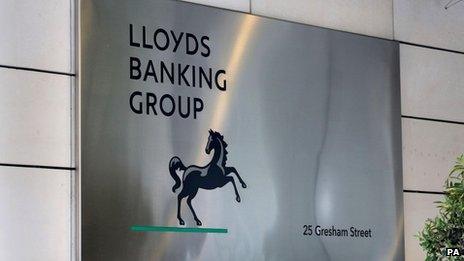How Lloyds' customers profited from its mis-selling
- Published
- comments

Lloyds' mis-selling was wrong, but not a rip-off
There is a paradox in the humiliation of Lloyds today for what the Financial Conduct Authority calls "serious sales incentives failings" and the record £28m fine imposed on the UK's largest retail bank.
Which is that although Lloyds behaved in a way regarded by the regulator as thoroughly reprehensible, by providing inappropriate financial motivation to its sales staff to sell unsuitable products to customers, those customers generally aren't out of pocket.
On the whole, they were flogged share ISAs and equity-linked structured products, or financial products whose value depends on the performance of the stock market. And since the stock market has risen since these sales were made, between 1 January 2010 and 31 March 2012, very few of these customers are out of pocket.
Many of them have done a lot better than would have been the case if they kept their cash in a savings account.
Or to put it another way, what was sold by Lloyds for the wrong reasons turns out to not to have been a customer rip-off.
So although Lloyds will have to provide redress to any customer who deserves it, the total cost to Lloyds of providing the redress will probably be millions of pounds - and will be a zillion miles from the £8bn it has set aside for mis-selling PPI credit protection.
Which is why its share price is down just a smidgen this morning, and is still above the cash price paid by taxpayers for our stake in Lloyds (boding reasonably well for next year's second tranche of the privatisation).
In fact, Lloyds' price is down marginally less than the fall in RBS's that was caused by the unanticipated departure to Santander of its respected finance director, Nathan Bostock.
None of which is to belittle the shocking incentives Lloyds put in place to encourage its staff to sell as many financial products as possible.
This statement from the FCA says it all: "The incentive schemes led to a serious risk that sales staff were put under pressure to hit targets to get a bonus or avoid being demoted, rather than focus on what consumers may need or want.
"In one instance, an adviser sold protection products to himself, his wife and a colleague to prevent himself being demoted."
The failures were systemic, such that - according to the FCA - seven out of 10 advisers at Lloyds TSB and three out of 10 at Halifax (also owned by Lloyds) received their monthly bonuses, even though Lloyds itself found a large proportion of their sales to be unsuitable or potentially unsuitable.
The regulator points out that 229 advisers at Lloyds TSB received bonuses "even when all of their assessed sales were deemed unsuitable or potentially unsuitable".
Now it looks particularly embarrassing that these practices continued after the arrival of the current chief executive, Antonio Horta-Osorio, on 1 March 2011.
However, as I understand it, he knew nothing about the incentives at that time. And the bank started to clean them up in the fourth quarter of that year, after Alison Brittain arrived to take charge of retail banking.
So there is perhaps an unfairness in the regulators' fining system, which almost no-one will care about. It stigmatises those on the bridge today, even if they weren't responsible for the wrongdoing.
And because the FCA found that the sales practices were the result of firm-wide governance lapses, the directors and managers in charge when the practices were introduced - led by the then chief executive Eric Daniels - are off the hook and won't be pursued.
As for how Lloyds motivates its staff today, I am told the sales incentives are now more long-term and more focused on meeting customers' needs.
Which means that Lloyds is selling considerably fewer financial products than it was.
So how does it increase its profits these days? Well, Horta-Osorio's strategy is to make Lloyds the bank with the lowest overheads and costs, rather than the one that flogs the most.